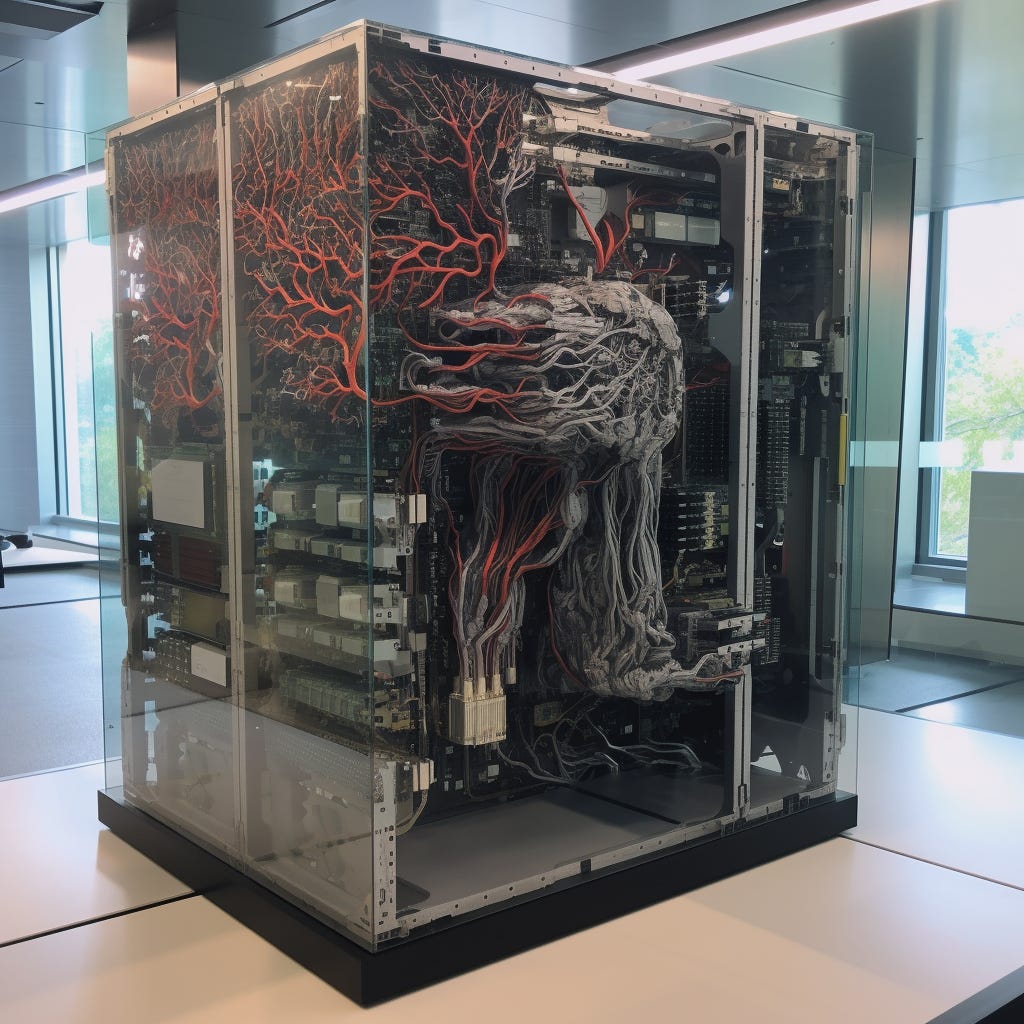Blurring Boundaries: Quantum & Organoid Computing Set to Redefine AI and Our Future
Currently, all the rage is all about what we can do with software and its exponential rise. But just like Nvidia is taking the system lock-in and fueling the AI revolution we should look not only at all the great advances and prospects AI will bring but also at the potential future that might await us in the area of computing beyond silicone chips and what this entails for us.
Why Should We Care About Computing?
Even though unless you’re a fan of LTT or are a hobbyist about building PCs most probably you’ve rarely thought about the hardware where we run our digital world. And that is mainly because of one “law” we’ve seen in computing that’s been going on since the 60s: Moore’s Law. Named after the CEO of Intel Gordon Moore, proposed that after observing the rates of advances in chip manufacturing the previous years he made a bold statement that later on became the pillars upon which we have built our modern world. “Every year the number of components in an integrated circuit would double”
This means that every year(or so) the computing power of microchips would double. And what started off as an observation from previous years became the metric of output for the industry and it has had a somewhat consistent behavior ever since. But, now we are reaching the limits of physics regarding traditional computing because the components that do the computing in our chips are becoming so tiny that soon enough, they will be affected by the rules of quantum physics, which could disrupt Moore’s law if we don’t change some things. And if we aren’t able to keep on this trend the progress of humanity and the development of our civilization could be at a risk of stagnating.
Into The Quantum Realm!
Luckily for a long time, people were already thinking about the “end” of Moore’s law and have been devising different solutions or alternatives for increased computing capabilities once we reach the limits of physics. And one of these solutions is QUANTUM COMPUTERS! Probably one of the most cool-sounding names but besides having a cool name the science behind it is also incredibly cool. And how do they work, well in a nutshell they make the most out of the shenanigans that happen at the quantum scale to make computing incredibly fast. (I ain’t no physics specialist so here's a short video explaining this stuff.
A couple of years ago Google claimed to have Quantum Supremacy and that is a very interesting ( although kinda scary) thing. Because Quantum supremacy in a couple of years (or decades) is not that Google has a Quantum computer that is “47 years faster” than the greatest supercomputer, but besides that, it means that this quantum computer can theoretically brute force its way into any encryption services so in theory (under a lot of assumptions) No password is safe under a quantum computing due to its incredible capacity for fast problem-solving compared to any other type of traditional computing.
Sadly Programming in quantum computing is hard AF, first because of the fundamental differences between quantum and classical computing principles. Quantum states, like superposition, and entanglement introduce a whole nother level of complexities that regular computing doesn’t have in binary systems(remember quantum computing works with qubits, not binary bits), requiring programmers to adopt an entirely new conceptual framework that is very difficult and is still not a mainstream area with many scientists working on it considering the difficulty of the challenge.
Also, the lack of mature and standardized programming languages for quantum computing is a huge headache for the industry, there exists a couple like Q# and Qiskit but they don’t come close to the number of researchers and developers working and growing the capabilities of the programming language. Finally due to the fact that observing a quantum state directly can alter it due to quantum mambo jumbo (again, not a physicist research that it is some weird cooky stuff), making it challenging to track and rectify errors. This also means that quantum computers themselves are highly sensitive, requiring precise environmental control to keep computers at extremely low temperatures to function effectively.
Tiny Brains in MY computer?!
Now, this is something that tingles me in all the right places in my brain, Organoid intelligence and what is called biocomputing is an incredible discovery, and ooh boy let me tell you all about it. So organoid intelligence is based on the scaling up of neurons and brain cells grown on a dish that can be arranged into a working functional information processing system, and scientists are discovering how to use these lab-grown brain cells in workable computers. With many advantages such as the capacity for parallel computing accelerated speeds and an incredibly low energy requirement (just think about the amount of electricity in our brains is incredibly low, barely enough to light a low wattage lightbulb for the most complex computing system in the known universe (the human brain) so imagine being able to scale that up into super organoid computers.
Some experts are claiming this could be a leapfrog and a pathway for complex AI systems to be run in more efficient and smaller organoid computers instead of huge server farms. Now of course there is still a lot to progress until this becomes a workable reality, but the potential is huge.

Especially if we consider the possibility of making organoid computers based on our very own cells which opens up the possibility of growing external brains that we could implement into our own biological systems and bodies as a prosthetic or an enhancement of our cognitive capabilities with extra brain matter that could Run an AI inside of it. It can help reduce the rejection of these enhancements by using cells taken from our own body as the bases, it also avoids the difficulties of synthetic electronic systems having to interact with biological systems. It is also “wetware” the same way our biology is so no need to have different precautions than the pens we already have for our own sake and protection. Personally, I think this in a couple of decades could lead to a revolutionary approach and easy pathway fro humanity and technology to merge and become more than the sum of its parts.
The Genes Chico. They never Lie
Ok now we got faster quantum computers and organic computers that could join us in a symbiotic manner enhancing humanity beyond their limits, but what about storage, more and more humanity is producing an incredible amount of data and we have been storing data in hard drives or solid-state drives but again, it is a very unsafe technology if we think in extreme scenarios we live in a planet orbiting a massive fission reactor(the sun) which could one day emit a powerful enough solar flare that would fry every single electronic outside of a very good faraday cage back to being a piece of plastic and metal with no use. So how could we as humanity preserve our knowledge and information in a safe long-lasting and redundant way?
Luckily- using the very building blocks of life as storage space is a great and fascinating idea. Scientists have discovered thanks to advances in genetic engineering how to modify and use the DNA of an organism as a hard drive for storing information in a safe way, now I don’t know much about the capacity of retrieving said data in a timely and easy fashion, but still it sounds like an interesting prospect.
Imagine storing our information in the Junk DNA of organisms that live with us. Maybe put very sensitive information into the genes of specific extremophile microorganisms that can survive in extreme conditions and have the ultimate secure information inside the genetic makeup of microorganisms in remote and dangerous locations.
Or on the other way around if you want the information to be public and open just publish it into the DNA of a very promiscuous organism and release it into the wild, then afterward you could store all of the code for an open source software on the genes of pigeons and just with a sample of cells from them and have access to large swaths of information. But I do believe that no bioethics board will approve of that, but oh well, one can dream…
Ok, so we got faster computers now what?
Now what? With sufficiently powerful thinking machines such as computers in years to come the realm of possibilities for humanity will expand beyond our imagination with AI’s rise we might be on the crisp of developing artificial superintelligence which will radically alter the way we are able to develop and solve problems as humanity. And I think it is very interesting to ponder in these times for example what futurist, author, and inventor Ray Kurzweil says about the 6 epochs of evolution where he outlines the journey of patterns of information from physics and chemistry to biology, brains, technology, and the merger of technology with human intelligence until finally and “awakening” of the universe in a certain way. And possibly these could not be possible without accelerating and expanding computational capabilities because now more than ever is through accelerated computational capabilities that humanity is evolving and developing itself as a species.
The future of humanity is in AI as it is in biotechnology and in any combination of technologies that allow us to expand and explore beyond the limits of our current condition. With this ethos it has driven us to further and further gain new knowledge and accelerate our capacity for learning growing and pondering like no other period in human history. And it is all upon the shoulders of outsourcing thinking into faster and better systems.
And now in this burgeoning age, we live in we are faced with the threat of future AI representing a threat to humanity’s place on Earth as the dominant intelligence in it or an incredible tool and ally in the next steps of human evolution on this planet and beyond.
Humanity’s destiny lies beyond our limitations, and we need to strive and survive so we can reach those goals and not fall on our way there like a dumb animal tripping over mere stones. We need to step up to the plate and overcome these challenges both technological, moral environmental, or whatever other things we will face ahead. The only way out of this is through, and it will not be easy it will not be pretty but beyond the horizon lies an endless ocean in our cosmos and it is calling for us to uncover the mysteries that lie outside and within as well.





